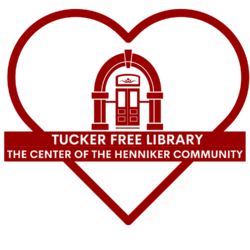3-Minute Civics: Libraries – places and spaces for democracy
Taking something for granted is a mistake we all make. A relationship. Our health. Until the pandemic, toilet paper. Another thing some forget to appreciate is the role of public libraries in the health of our democracy.
Civic health includes not only political engagement but participation in all kinds of activities that improve a community’s quality of life. Libraries can play a key role. I was reminded of that last night while attending a book discussion. For the first time since the pandemic started my library’s circulation desk was open in the evening, and there were fliers everywhere about upcoming events. Some of the planned activities will be online or outdoors or with masks, but they are happening.
While serving as a library trustee and later a foundation board member, I relished knowing what was going on at our local institution. At the time, the Baker Free Library in Bow offered children’s story hours, adult book discussions, art exhibits, craft workshops, and cultural programs. It hosted teen public speaking contests and local candidates’ nights. Groups devoted to robotics, quilting, car shows, and conservation met in the building. Patrons could borrow books and media; get computer help; submit a passport application; make copies; or simply make conversation. The staff fielded questions and handled crises (roof leaks, tech glitches, even medical events) while using their library science training to develop the collection and organize programming for all ages. Acquaintances still come up to me and say, “We met at the library when our kids were kids.”
Public libraries are not just venues, though. They play a huge role in protecting our First Amendment rights to the free expression of ideas and access to information. The American Library Association and New Hampshire Library Association strongly condemn attempts to censor books and other media. Local librarians stand up in person for free speech. I saw this while working at New Hampshire Humanities providing speakers to libraries statewide. Occasionally an attendee would object to the material presented. “Liar! You’re a liar!” one shouted at a professor describing Islam as a religion teaching peace. He turned out to be part of a New Hampshire-based anti-Muslim group. For security reasons, I let other libraries that had booked this presentation know what had happened. Although glad to be alerted, the librarians all kept their bookings – and added a fierce reminder about free speech and civility to their introductions.
In New Hampshire, public library roots run deep. In commemoration of the 300th anniversary of the New Hampshire State Library, Michael York wrote a series of pieces about all things library. New Hampshire is home to the first state library (1717), the first library supported by municipal taxation as opposed to private membership fees and subscriptions (1833), and the first state law authorizing towns to raise money to establish and maintain their own libraries (1849). One article describes a cool tool to figure out the dollar value of your annual library use. Another discusses how in the early 2000s, the advent of the internet was perceived as a dire threat to books. But libraries pivoted, adopting and sharing digital tools and skills in continuation of their information-sharing mission. These tools and skills, and the knowledge needed to discern among sources, have proven crucial for participation in today’s society.
Overall, New Hampshire residents are well educated and interact regularly with friends and family, according to the 2020 New Hampshire Civic Health Index. But our trust in government, the media, and even our neighbors is declining. Such disconnection threatens democracy itself, commentators warn. Can libraries help? Yes. They provide physical and intellectual space for community to develop. In small towns, the library is one of the few places where adults can gather, meet one another, and share experiences and ideas. In rural areas, it may be the closest thing to a museum within miles. For some, a library is their only access to the internet. Even during the COVID-19 shutdown, libraries managed to inform and entertain through e-newsletters, online programs, and free audiobooks and films.
As thrifty as the taxpayers who support them, libraries supplement their own work by collaborating with other organizations. Starting in March, the New Hampshire Institute for Civics Education and New Hampshire Public Radio are partnering on a series of community conversations hosted by Laura Knoy on the topic “Building Civic Strength.” UNH’s Carsey School of Public Policy has a new “Coffee & Conversations” series on “Policy Education for Civic Engagement” available free online. New Hampshire Humanities, in anticipation of the 250th anniversary of the Declaration of Independence, is launching programs and grants on what it means to “build a more perfect union” and be an “informed citizen.” You can bet New Hampshire libraries will be first in line. As places and in their practices, libraries make space for democracy.
New Hampshire Bulletin is part of States Newsroom, a network of news bureaus supported by grants and a coalition of donors as a 501c(3) public charity. New Hampshire Bulletin maintains editorial independence. Contact Editor Dana Wormald for questions: info@newhampshirebulletin.com. Follow New Hampshire Bulletin on Facebook and Twitter.
